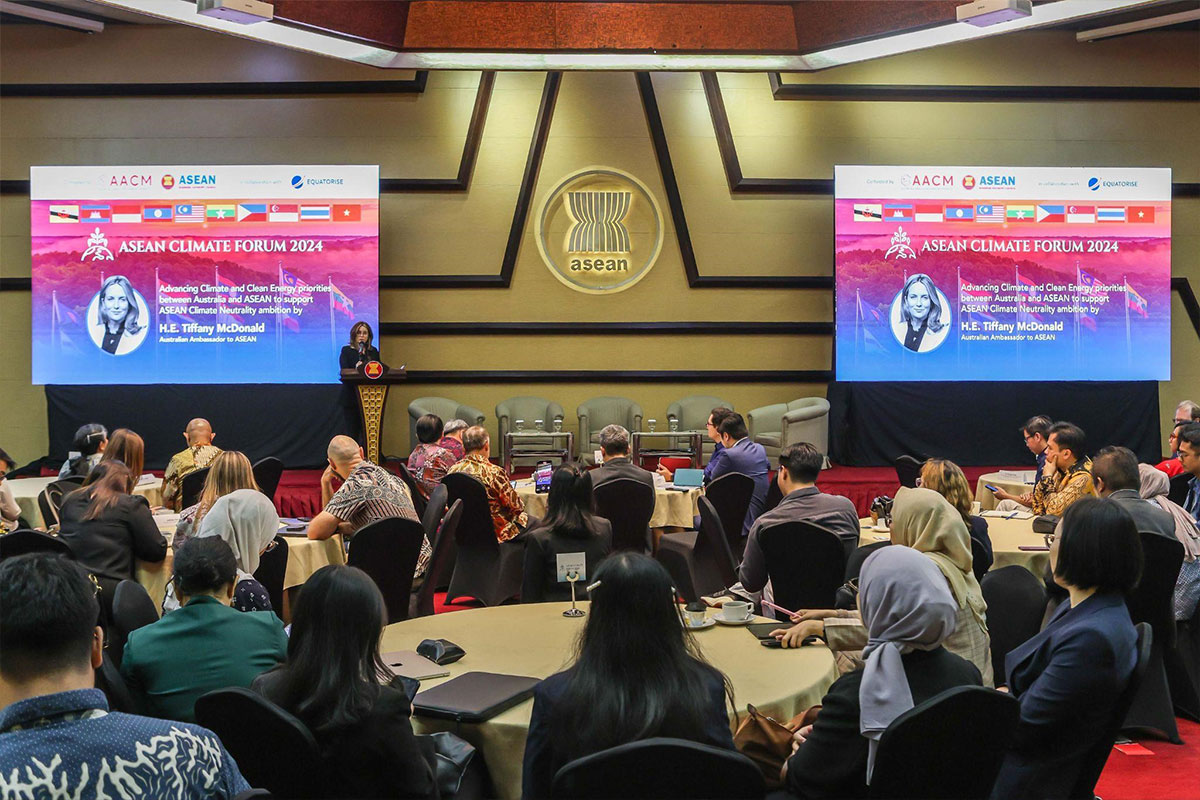
ASEAN Climate Forum 2024: Accelerating Regional Climate Action
Jakarta, Indonesia – December 5, 2024 – The ASEAN Climate Forum returned to the home of ASEAN this year, hosted at the ASEAN Hall of the ASEAN Secretariat in Jakarta, Indonesia.
Organized by the ASEAN Alliance on Carbon Markets (AACM) and the ASEAN Business Advisory Council (ASEAN BAC) in collaboration with Equatorise Advisory, the forum convened over 100 business leaders, policymakers, and senior experts in sustainability and climate from across the region. The discussions centered on two pivotal themes for ASEAN’s climate and net-zero progress: carbon markets and cross-border green energy cooperation.
Opening Segment: Leadership in Climate Action
The gallery was not found!
The forum commenced with opening remarks from esteemed leaders:
Steven Marcelino, Deputy Chair for International Affairs at AACM and Managing Partner and CEO of Equatorise, highlighted the forum’s focus on unlocking growth through carbon markets and advancing cross-border green energy cooperation, while also showcasing Malaysia’s ASEAN-BAC chairmanship in driving sustainability.
Dharsono Hartono, Permanent Chair of AACM, Vice Chair of Environment at KADIN Indonesia, and CEO of PT RMU, who emphasized ASEAN’s unique potential to lead in carbon markets, leveraging its natural resources and biodiversity to unlock significant economic benefits while addressing decarbonization challenges.
Tan Sri Nazir Razak, Chair of ASEAN BAC Malaysia and Founding Partner of Ikhlas Capital, reaffirmed Malaysia’s commitment to prioritizing carbon markets during its ASEAN Chairmanship in 2025, including spearheading initiatives like the ASEAN Common Carbon Framework to promote equitable growth.
H.E. Nararya S. Soeprapto, Deputy Secretary-General of ASEAN for Community and Corporate Affairs, delivered a special address on ASEAN’s climate neutrality ambitions, emphasizing the role of carbon markets in low-carbon growth.
H.E. Tiffany McDonald, Australian Ambassador to ASEAN, underscored Australia’s support for advancing ASEAN’s climate and clean energy goals.
Bernardino M. Vega, Alternate Chair of ASEAN-BAC Indonesia and CEO of Adakami, emphasized the forum’s role in uniting industry leaders, policymakers, and experts to drive the green transition and position ASEAN as a global leader in sustainable development.

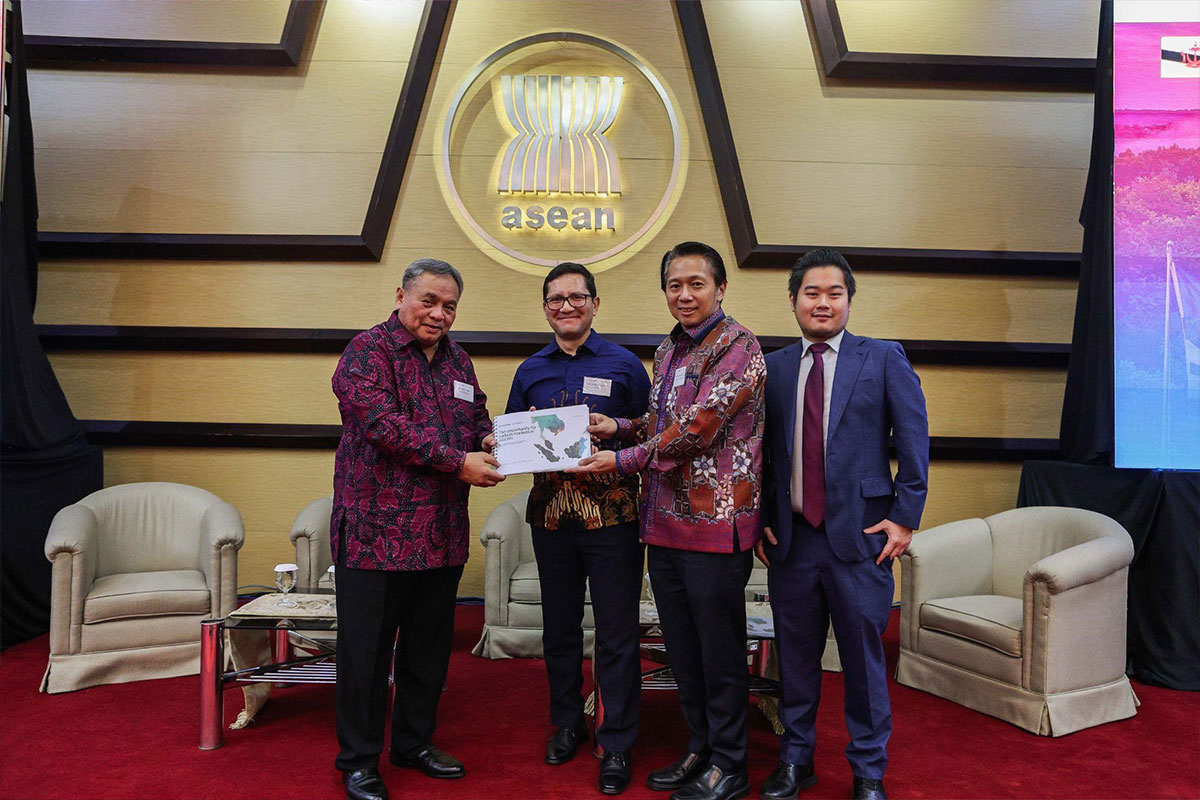
During this segment, AACM and Abatable launched the Opportunity for Carbon Markets in ASEAN report. Juan Carlos Arredondo Brun, Director of Knowledge, Policy & Advocacy at Abatable, presented key findings, highlighting the immense economic and environmental potential of carbon markets in the region:
- Carbon markets in ASEAN could mitigate up to 220 MtCO2e by 2030 and 1,120 MtCO2e by 2050, generating $65 billion in annual carbon revenues by 2030 and $267 billion by 2050.
- Cumulative revenues could reach $946 billion to $3 trillion between 2025 and 2050.
- By implementing enabling policies, carbon markets could create 5.7 million jobs by 2030 and 13.7 million jobs by 2050 across ASEAN.
For more information, download the full Opportunity for Carbon Markets in ASEAN report.
Segment 1: Unlocking New Growth Engines Through Carbon Market Development in ASEAN
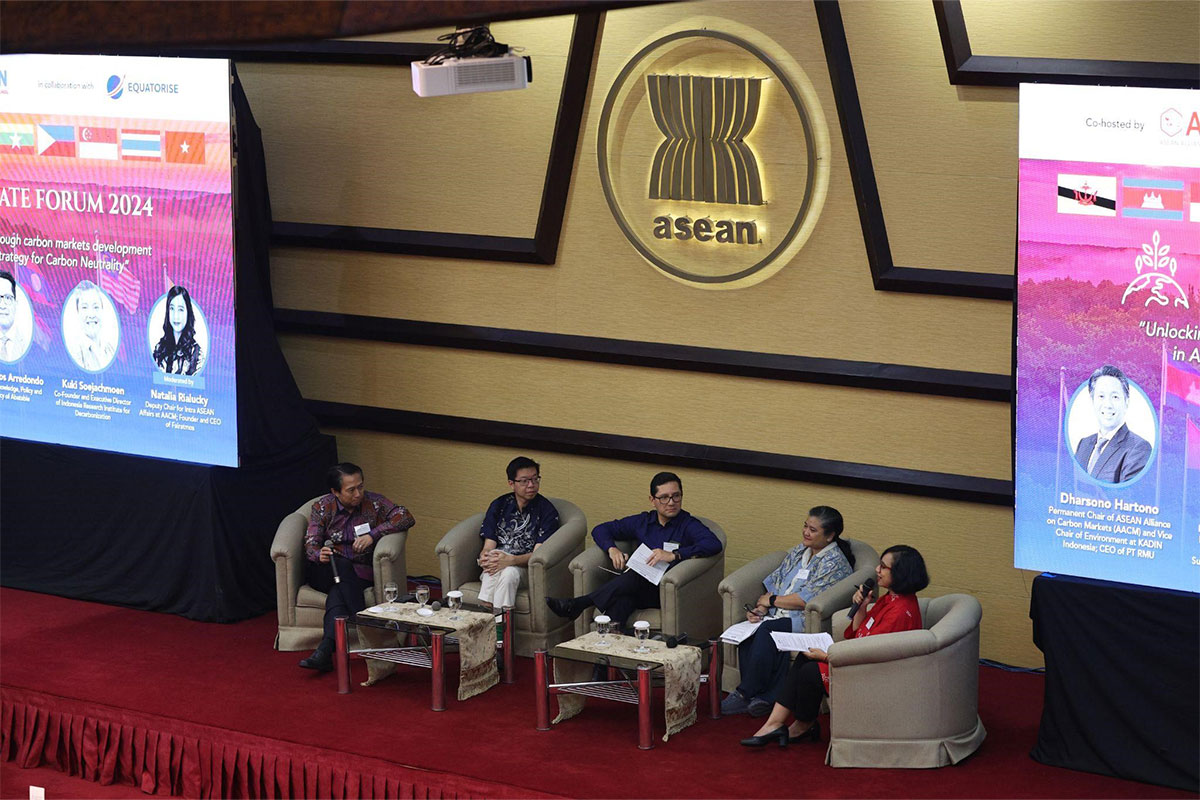
The first segment, focused on advancing ASEAN’s strategy for carbon neutrality, began with a keynote presentation by Dr. Renard Siew, President of the Malaysia Carbon Market Association (MCMA) and Group Head of Corporate Sustainability at Yinson Holdings. Dr. Siew provided an update on the ASEAN Common Carbon Framework, highlighting a recently signed Memorandum of Collaboration among four ASEAN carbon alliance entities at COP29, signifying a major step forward in regional carbon market alignment.
The subsequent panel discussion, moderated by Natalia Rialucky, Deputy Chair for Intra-ASEAN Affairs at AACM and Founder and CEO of Fairatmos, delved into critical issues such as the roles of governments and private sectors in scaling carbon markets, strategies for harmonizing ASEAN’s diverse Nationally Determined Contributions (NDCs) to create a unified carbon market, and ensuring the integrity of carbon credits to prevent greenwashing.
Key takeaways from the panel included the necessity of localized methodologies tailored to ASEAN’s unique contexts to address challenges and unlock bottlenecks. The discussion highlighted significant barriers, such as high costs for Nature-Based Solutions (NBS) and delays in project approvals, stressing the urgency for clear priorities and readiness signals for international cooperation.
The panel further emphasized the importance of evolving NBS through robust valuation frameworks and active government support to drive sustainable development. Additionally, ensuring high integrity in carbon markets was identified as critical, with a strong call for reliable data and harmonized methodologies to build trust and enhance the effectiveness of regional initiatives.
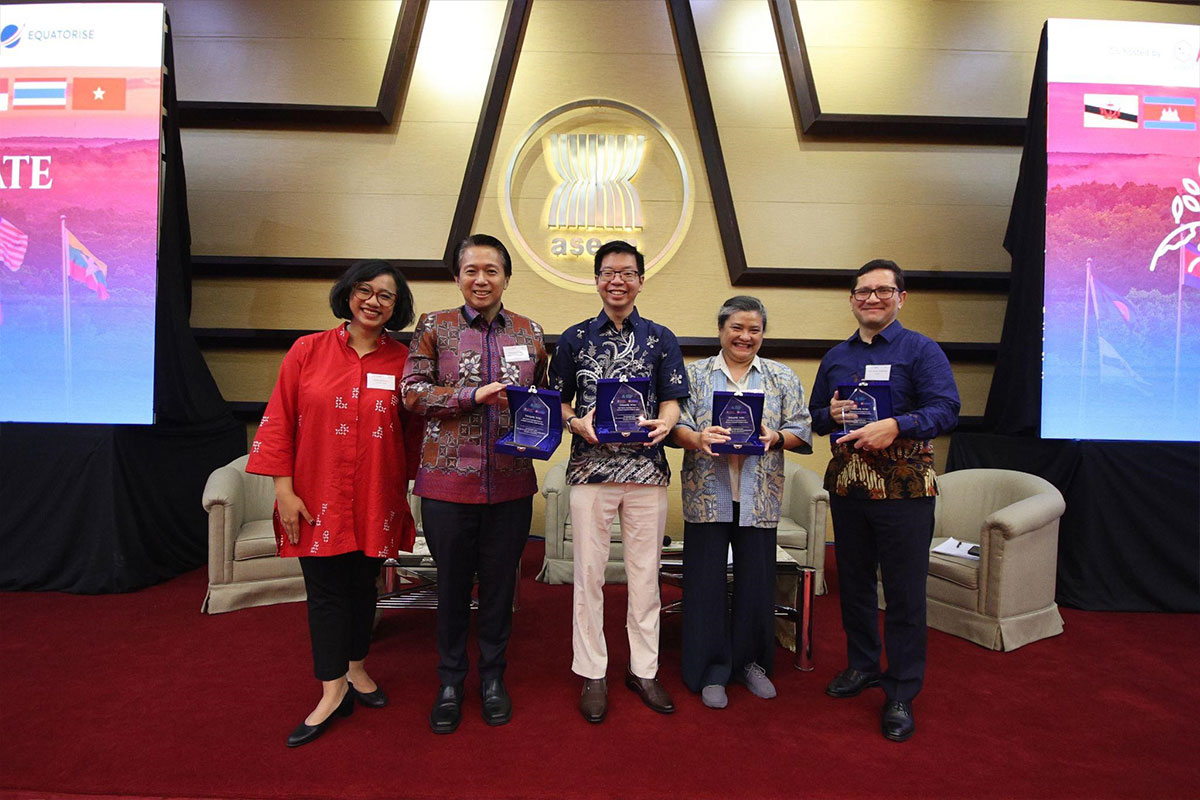
Segment 2: Mainstreaming Cross-Border Green Energy Cooperation in Southeast Asia
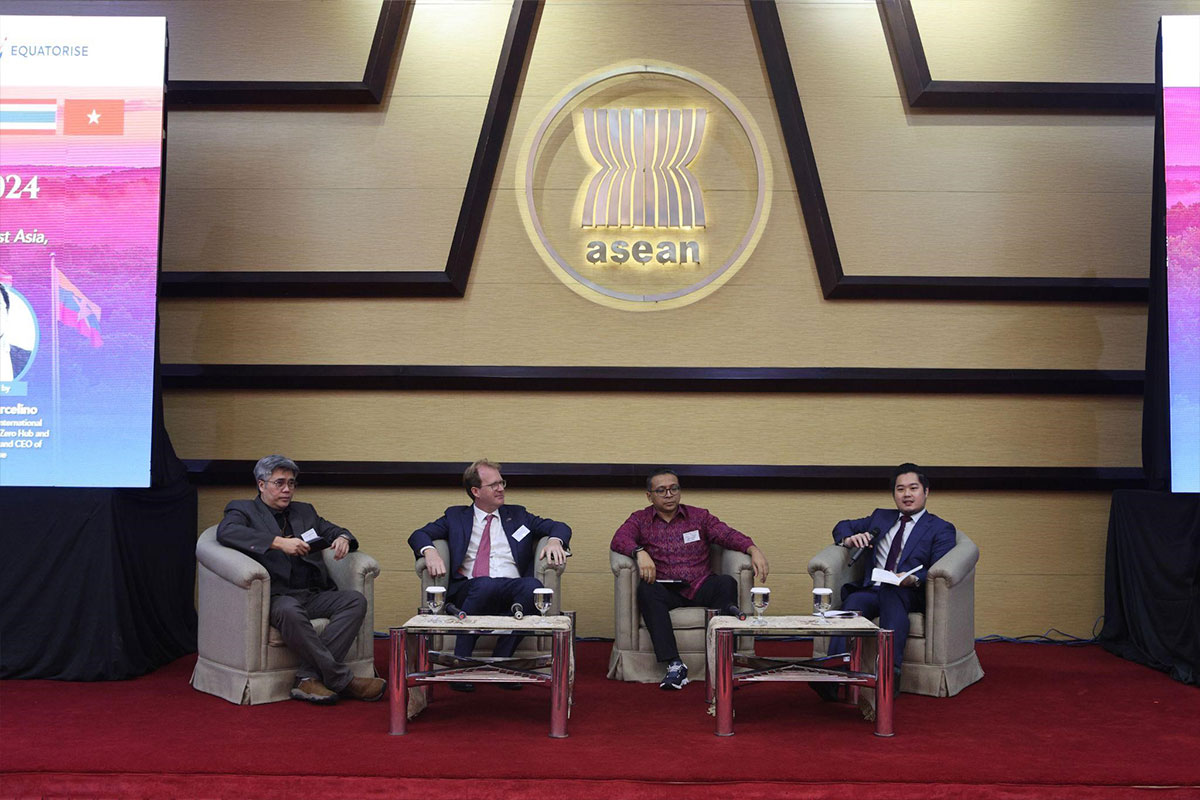
The second panel, moderated by Steven Marcelino, Deputy Chair for International Affairs at Kadin Net Zero Hub and Managing Partner and CEO of Equatorise, explored strategies for advancing cross-border green energy cooperation in Southeast Asia, leveraging the region’s strengths in critical minerals.
Key discussions addressed ASEAN’s need to overcome policy and infrastructure challenges to enhance regional energy connectivity, the role of blended finance in accelerating energy transitions, and the development of a sustainable critical minerals supply chain to support green energy initiatives.
Panelists emphasized the importance of ASEAN leapfrogging traditional energy transitions by prioritizing interconnected smart grids and microgrids to drive clean energy systems. Dr. Nuki Agya Utama of ERIA highlighted that strong policies and regional collaboration are essential to achieving this vision.
The panel also underscored the evolving role of the private sector in renewable energy innovation, with Dharma Djojonegoro of Adaro Power showcasing transformative projects like floating solar in Batam as examples of the innovations needed to meet climate challenges.
Furthermore, Gustaaf Reerink from the EU-ASEAN Business Council affirmed Europe’s readiness to provide technical and financial support for ASEAN’s green energy initiatives. However, he stressed the critical need for addressing policy inconsistencies and infrastructure gaps to ensure the viability and success of cross-border energy projects.
The panel collectively highlighted the urgency of regional cooperation and innovation in achieving a sustainable and interconnected energy future for ASEAN.
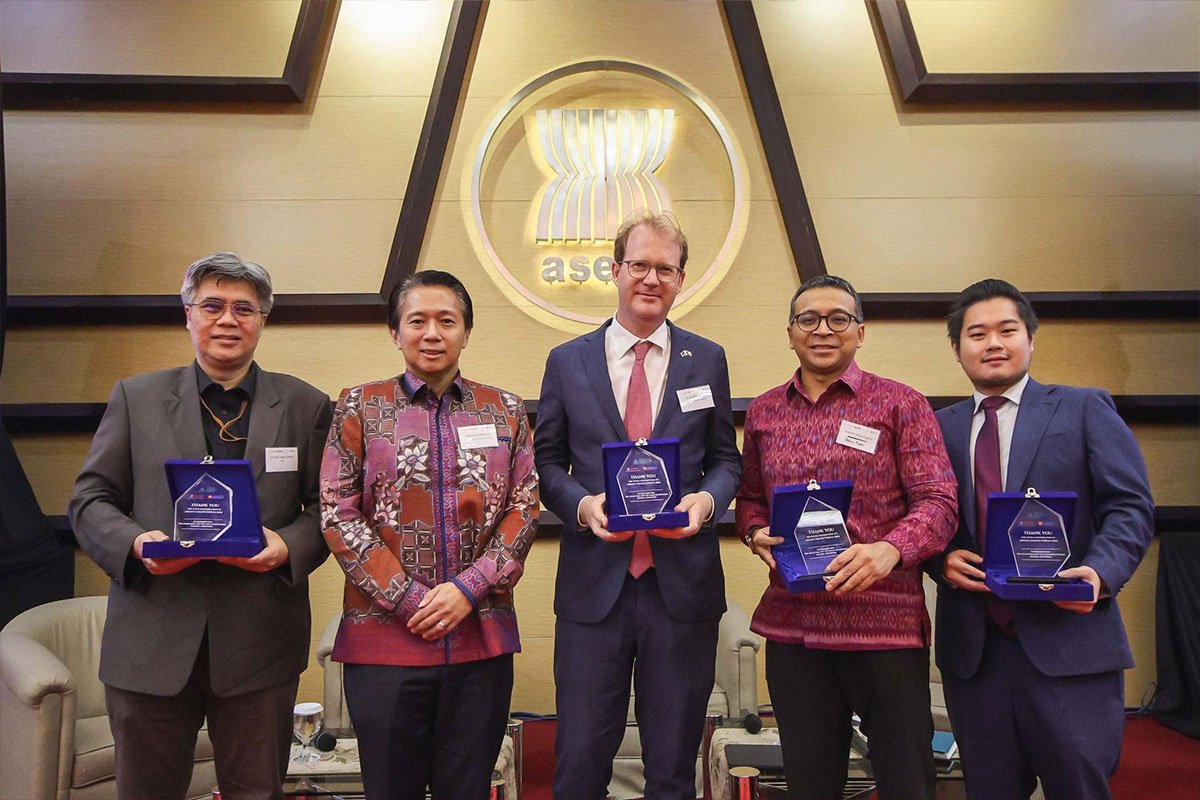
Dr. Renard Siew, President of Malaysia Carbon Market Association said,
“Localized methodologies are critical to our success. In Malaysia, developing our own protocols and aligning with other ASEAN standards can help unlock bottlenecks and improve project feasibility. We need mutual recognition frameworks and capacity-building programs to ensure all ASEAN nations can participate effectively in carbon markets.”
Juan Carlos Arredondo Brun, Director of Knowledge, Policy & Advocacy of Abatable said,
“ASEAN nations need to clearly signal their priorities. International markets are watching to see how willing we are to participate and invest in compliance and voluntary mechanisms. Policy clarity will attract investment and enable ASEAN to integrate carbon markets with international standards.”
Dharsono Hartono, Permanent Chair of ASEAN Alliance on Carbon Markets said,
“Nature-based solutions were undervalued for years because we lacked the frameworks to calculate their true worth. Now, with government support, we can build robust compliance markets. High-integrity voluntary carbon markets require public trust. ASEAN leaders must endorse these markets and build awareness of their benefits.”
Kuki Soejachmoen, Co-Founder and Executive Director of Indonesia Research Institute for Decarbonization said,
“Nature-based solutions like REDD+ and biochar can drive emissions reductions and support rural communities. Integrity is key. Without reliable data and harmonized methodologies, we risk undermining trust in the market and losing opportunities for global collaboration.”
Dr. Nuki Agya Utama, Director for Energy Policy and Head of the Asia Zero Emission Center at ERIA said, “ASEAN must leapfrog traditional energy transitions. With strong policies and regional cooperation, we can move towards interconnected smart grids and microgrids to support clean energy.”
Gustaaf Reerink, Executive Board Member of EU ASEAN Business Council and EuroCham Indonesia; Foreign Counsel at ABNR Counsellors at Law said, “Europe is ready to provide technical and financial support. But ASEAN must address policy inconsistencies and infrastructure gaps to make cross-border energy projects viable.”
Dharma Djojonegoro, Head of Permanent Committee of Investment on Green Economy Affairs at KADIN Indonesia; CEO of Adaro Power said, “Adaro’s decision to split into two entities—thermal coal and renewable energy—is a testament to how businesses are evolving to meet climate challenges. Floating solar in Batam is just one example of innovation we need to scale.”
The forum’s discussions highlighted the urgency and potential for ASEAN to lead in regional sustainability efforts. By scaling carbon markets, advancing renewable energy innovation, and fostering international collaboration, ASEAN can not only meet its climate goals but also unlock substantial economic and social benefits for the region.
About ASEAN Climate Forum
The ASEAN Climate Forum aims to advance climate actions in the Southeast Asia region by convening key business leaders and policymakers from ASEAN countries and the dialogue partners. Building on the success of the inaugural ASEAN Climate Forum in Jakarta in 2023—which spotlighted the expansion of carbon markets and introduced the ASEAN Alliance on Carbon Markets under Indonesia’s ASEAN chairmanship—the forum returns in 2024 to continue driving progress.
ASEAN Climate Forum redoubling its efforts to highlight climate and clean energy priorities, including scaling up of carbon markets both compliance markets and voluntary carbon markets (VCM). The forum also spotlight emerging initiatives surrounding cross-border green energy cooperation in Southeast Asia, powered by critical minerals strengths in the region.
About ASEAN BAC
The ASEAN Business Advisory Council (ASEAN-BAC) is the apex private sector body of ASEAN and was established by the ASEAN Heads of State and Government (HOSGs) at the 7th ASEAN Summit in November 2001 in Bandar Seri Begawan, Brunei Darussalam. ASEAN-BAC was set up with the mandate to provide private sector feedback and guidance to boost ASEAN’s efforts towards economic integration. Aside from providing private sector feedback on the implementation of ASEAN economic cooperation, the Council also identifies priority areas for consideration of the ASEAN Leaders. Accordingly, ASEAN-BAC’s activities are primarily focused on reviewing and identifying issues to facilitate and promote economic cooperation and integration.
About ASEAN Alliance on Carbon Markets (AACM)
The ASEAN Alliance on Carbon Markets aims to scale the growth of voluntary carbon markets across ASEAN (the Association of Southeast Asian Nations) and support the implementation of compliance markets. AACM is the first private sector-led body to advocate for cross-border efforts in the areas of carbon market development. The alliance fosters a regional ecosystem and acts as a focal point for international partnerships, with activities including capacity building and technical assistance.
About Equatorise Advisory
Equatorise is an international consulting firm supporting Indonesian corporates and institutions to seize opportunities in the UK and the EU, as well as supporting British and European companies and institutions to unlock values in Indonesia, the rising socio-economic powerhouse in the Indo-Pacific region. We help our clients to shape opportunities from the twin transformation of the decade – stemming from digital transformation and sustainable transition into a net-zero post-pandemic future. As a London-headquartered Indonesia market specialist, we have three focus areas; (1) Net Zero Sustainability Transition; (2) Digital Technology & Innovation; and (3) Global Health and Life Sciences.

